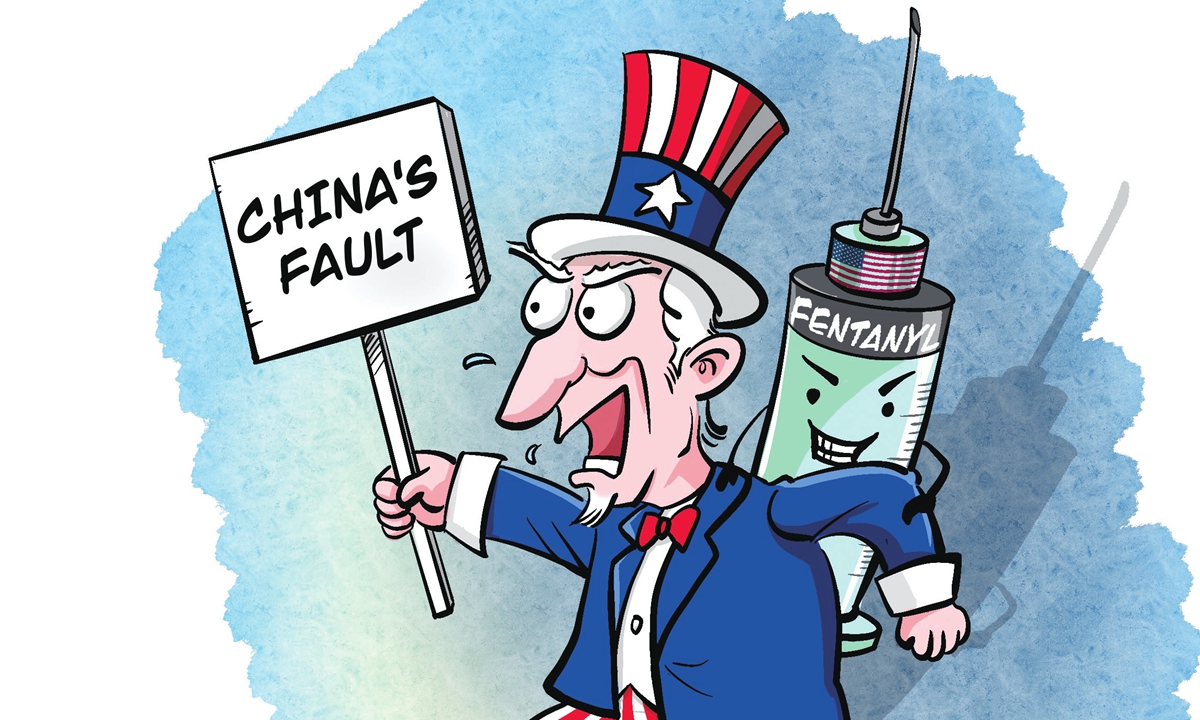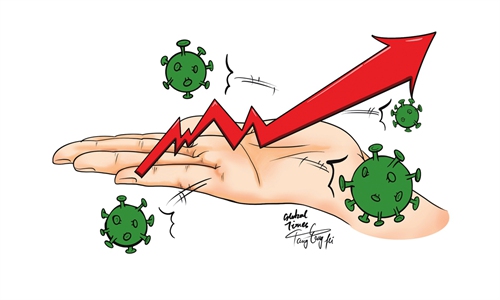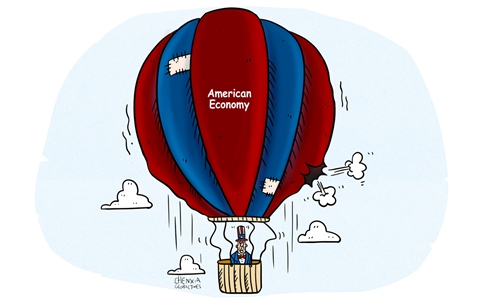
Illustration: Liu Xidan/GT
Recently, the US Department of Justice announced indictments charging China-based companies and their employees with crimes related to fentanyl production. Faced with these unfounded accusations, it is necessary to provide clarification regarding the history of the fentanyl crisis in the US.In 1960, Dr. Paul Janssen, the founder of Janssen Pharmaceuticals, synthesized a new analgesic called fentanyl, which proved to be 80-100 times more potent than morphine in relieving pain. However, it's important to note that fentanyl is highly detrimental to the human nervous system, and its excessive use can lead to addiction, respiratory depression and death. Studies have shown that a mere two milligrams of fentanyl is sufficient to cause the death of an adult.
In light of this, China implemented strict control measures on fentanyl and its analogs in 2019, based on the previously established Supplementary List of Controlled Narcotic Drugs and Psychotropic Substances. The list goes far beyond the scope of the United Nations Convention Against Illicit Traffic in Narcotic Drugs and Psychotropic Substances, making China the first country in the world to regulate fentanyl and its analogs comprehensively.
In contrast, the US, with less than 5 percent of the world's population, consumes 80 percent of the world's opioid drugs. The US has a population of 332 million. In 2021, findings by the National Center for Drug Abuse Statistics showed that about 19.4 percent of Americans have used illegal substances at least once. Over 50 million Americans have experimented with psychotropic drugs, representing 15 percent of the population. More than 60 percent of the world's drug production is destined for the US each year, with sales of just three drugs - marijuana, cocaine, and heroin - reaching 16,000 tonnes annually. In 2017, the US government announced that deaths from fentanyl abuse exceeded 70,000, a 45 percent increase from the previous year. Ironically, this exceeded the number of deaths caused by HIV/AIDS, traffic accidents and gun violence in the same year.
Instead of making self-inspection and correction, the US looked around and found a scapegoat as it often does whenever it cannot solve a domestic problem. The selling of "fentanyl precursors" was the latest pretext that the US employed. However, much different from a scary description from the US side, this "precursor" is a kind of widely used industrial chemicals. Bluffing and shifting blame is what the US authorities are good at, only to evade the legal obligation explicitly stipulated by the United Nations Convention Against Illicit Traffic in Narcotic Drugs and Psychotropic Substances that the importing country has the responsibility to ensure that the imported products are not used for illicit purposes.
Pharmaceutical companies in the US also contribute to the abuse of fentanyl in this country. They bribe doctors and scientists under the guise of consulting fees and educational programs to encourage them to publicly endorse opioid medications. Purdue Pharma even handed out coupons to patients, allowing them to use the opioid painkiller OxyContin free for 30 days. Will a patient escape the clutches of addiction? Hardly. From 2006 to 2012, with an almost unchanged number of cancer patients in the US, pharmaceutical companies still produced over 76 billion opioid pills nationwide, which means that every adult in the US received a month's worth of opioid medications on average. It is fair to say that over the past decade the fentanyl crisis in the US today is another bloodbath created by capitalism.
To help mitigate this problem, China and the US established the Bilateral Drug Intelligence Working Group in 2003 and held nine meetings to date. Yet, despite China's sincere commitment to anti-drug cooperation, the US sanctioned China's Ministry of Public Security, the National Narcotics Laboratory and other facilities, which are responsible for testing and controlling fentanyl substances. As a result, anti-drug cooperation has stalled between the two countries. With sanctions still in place, the normalization of anti-drug collaboration is out of the question.
In brief, the fentanyl crisis in the US is an internal problem that requires domestic action. What the US needs to do is quite simple: stop defaming China for exporting some common chemicals and get down to work on its own problems at home.
The author is a commentator on internationals affairs, writing regularly for Xinhua News, Global Times, China Daily, CGTN etc. He can be reached at xinping604@gmail.com



